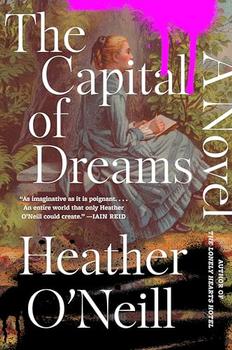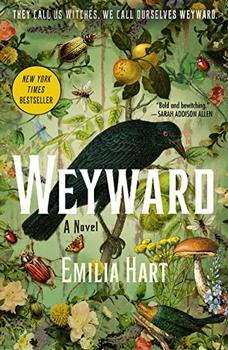Summary | Excerpt | Reviews | Beyond the book | Read-Alikes | Genres & Themes | Author Bio

A Novel
by Heather O'Neill"Sometimes war can set a woman free," declares Sofia Bottom's larger-than-life intelligentsia mother Clara. The fictional country of Elysia reveres the arts and has evolved beyond all that is considered traditional, particularly around roles and stereotypes for women. Clara Bottom is Elysia's most brilliant thinker and writer and the whole country respects her. It's tough for fourteen-year-old mousy Sofia to grow up in her mother's shadow and live up to Clara's outsized expectations of what a modern woman should be: full of ideas, eloquent of speech, and sexually unhindered. When war breaks out in Elysia and the children of the Capital are taken away on trains from the occupying forces, Sofia feels in her heart that her mother does not find her worthy of the resistance movement. Clara sends Sofia off with her most prized possession, a manuscript detailing the life and culture of Elysia, which Sofia must protect and hand over to allies at the border so that the West won't forget the country and will come to its aid. Sofia feels she is just another tool in Clara's kit to perpetuate her own legend. When the enemy stops the children's trains on their way out of the Capital, Sofia senses something wrong and flees to save her life, losing her mother's manuscript in the process. Knowing she cannot return home having failed in her mission, she wanders the war-torn country with a talking goose as a companion, hiding in the woods still steeped in Elysia's old theistic fairytales.
In The Capital of Dreams, Heather O'Neill unpacks meaty themes around identity and coming-of-age; mother-daughter relationships; and war, occupation, and genocide. Sofia is a child at the beginning of the war and feels every bit like one, eager to grow up and be part of the adults' resistance efforts. She views being sent away from her mother's clique as a mark of her immaturity, but this only hastens her growth as she faces decisions on her own. She learns independence, comes to understand her values and priorities as she deals with tradeoffs between survival and loyalty, and has her first interactions with sex as she meets her old friend Celeste, who has been taken into sexual slavery by enemy soldiers. Sofia's very presence becomes a mark of resistance in a genocide that seeks to wipe all of Elysian culture, language, and population from the face of the Earth. The Goose, her animal guide, could represent either her own inner voice or the voice of her mother, depending on one's interpretation. Throughout her journey, she meets characters symbolizing different feminine roles, as she decides who she wants to become. There is her mother, a feminist who has a tongue that could eviscerate any man but stays silent under the threat of physical violence; Celeste, who chooses the relative security of survival through being needed and "loved" by enemy soldiers over the uncertainty of fleeing her captivity; and Rosalie, the owner of the Black Market, which Elysians and the enemy alike seek out for its outlawed goods. Rosalie travels freely, but holds no one and nothing dear.
Sofia frequently returns to memories of her mother, cherished ones of when wartime occupation forced Clara to stay in the apartment with her, and less tender ones, too. Though Sofia often sees her mother as an egotist, puffed up with a sense of importance her daughter cannot live up to, some moments reveal, despite Clara's insistence that motherhood is not the peak of a woman's powers, just how dearly she loves Sofia. Her insistence on sending her out of the Capital may, in the end, be a mother's attempt at protecting her child from danger, not just concern for a mission or a ploy to get her out of the way and be alone again.
This novel reads like a modern Grimms' Fairy Tales, the original dark, twisted tales, rather than the kinder versions we tell children as bedtime stories. Heather O'Neill, child of a World War II veteran, grew up on a tradition of strange oral stories morphed into fairytales from her father and uncles about their time in the war, which she has drawn on to create the whispering forests of Elysia and the Goose. At the time of this novel's publication there are multiple instances of war in the world (Ukraine, Gaza), but O'Neill's story does not specifically mirror any of these, though she traveled to Gaza in 2023 as part of her research for writing it. Instead, there are echoes of multiple international conflicts and brutalities, dating as far back as the Nazi takeover of European cities in World War II. She paints a portrait of occupation, genocide, and the kind of wartime horrors that can come even without these two subtypes of violence (e.g., witnessed mass death, large-scale destruction). The story is told through the eyes of orphaned children forced to grow up quickly, a common throughline across war narratives. The Capital of Dreams is an allegory of war that shows its roots in the past, but also how the modern seeds of it are planted in the present.
![]() This review
first ran in the January 15, 2025
issue of BookBrowse Recommends.
This review
first ran in the January 15, 2025
issue of BookBrowse Recommends.

If you liked The Capital of Dreams, try these:

by Genoveva Dimova
Published 2024
The Witcher meets Naomi Novik in this fast-paced fantasy rooted in Slavic folklore, from an assured new voice in genre fiction.

by Emilia Hart
Published 2024
Weaving together the stories of three extraordinary women across five centuries, Emilia Hart's Weyward is an enthralling novel of female resilience and the transformative power of the natural world.
Your guide toexceptional books
BookBrowse seeks out and recommends the best in contemporary fiction and nonfiction—books that not only engage and entertain but also deepen our understanding of ourselves and the world around us.